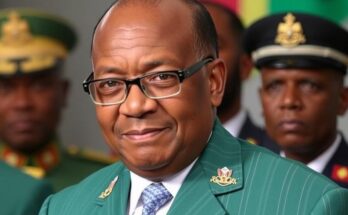Mozambican police used tear gas to disperse protesters against alleged electoral fraud, following the shooting of two opposition affiliates. Opposition leader Venancio Mondlane called for a general strike, with reports indicating widespread participation and international condemnation of the violence. Allegations of electoral misconduct cast doubt on the legitimacy of the election results.
In Mozambique’s capital, Maputo, riot police recently employed tear gas to disperse a crowd protesting allegations of electoral fraud, following the deaths of two opposition affiliates. On Monday, several hundred demonstrators, including journalists, fled as heavily armed police advanced along a prominent street. Reports from Reuters indicated that some police officers discharged firearms during the dispersal. Adriano Nuvunga, the director of the Centre for Democracy and Human Rights in Mozambique, reported that two journalists and a security guard were shot at, albeit without serious injuries. Opposition leader Venancio Mondlane, who contested in the presidential elections on October 9, called for a general strike to contest preliminary results indicating the ruling Frelimo party’s lead. As a result, many shops in Maputo closed, and helicopters patrolled the skies above the city, which houses approximately one million residents. Mondlane, commonly referred to as “Venancio,” claimed in a post on Facebook that he encountered police obstacles that delayed his departure from home for the demonstration. He recounted, “This morning I couldn’t get out of my house. I had people at my doorstep, including the police. It took me an hour to get out.” Tensions escalated over the weekend after the fatal shooting of two associates of Mondlane in Maputo. Witnesses described how Lawyer Elvino Dias and Paulo Guambe, an electoral candidate from the Podemos party, were surrounded by cars and shot. While the Podemos party leader, Albino Forquilha, confirmed the incident, police have initiated an investigation without disclosing the identities of the deceased. International bodies such as the European Union, African Union, and United Nations have condemned the violence, with UN Secretary-General Antonio Guterres urging all Mozambicans to remain calm and reject violence. The head of the African Union Commission expressed deep concern regarding reported post-election violence and recent fatalities. As the presidential and parliamentary election results await official announcement, allegations of electoral fraud linger. Observers from the United States remarked that the election fell short of international democratic standards, citing incidents of vote buying, intimidation, and discrepancies in voter registration. Initial indications of low voter turnout in Mozambique, a nation of approximately 33 million inhabitants, could further undermine the legitimacy of the electoral outcome. Despite stepping down after two terms, former President Filipe Nyusi’s successor, Daniel Chapo, of the ruling Frelimo party, is anticipated to secure victory. Other candidates included Ossufo Momade from the opposition Renamo party and Lutero Simango of the Mozambique Democratic Movement. Mondlane has proclaimed victory and deemed the general protest a “great success,” asserting that “the country was paralysed … 95 percent of private and public services across the country were paralysed.” The strike was reported to have resonated across various cities, including Chimoio, Nampula, Beira, and Maputo.
This recent event in Mozambique highlights escalating political tensions following disputed electoral outcomes. The two deaths of opposition allies appear to have ignited public protests, amplifying accusations of electoral fraud and violence by law enforcement. With international organizations monitoring the situation, the responses and attitudes of various political leaders are crucial for the stability of Mozambique’s democratic processes.
In summary, the violent dispersal of opposition protests in Mozambique following allegations of electoral fraud underscores the precarious state of the country’s democracy. The opposition leader’s calls for protests indicate a significant discontent with the electoral process. The recent fatalities, along with international condemnation, raise urgent questions about political stability and the commitment to upholding democratic standards in Mozambique.
Original Source: www.aljazeera.com




